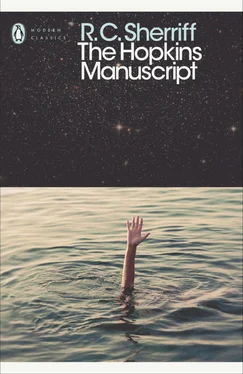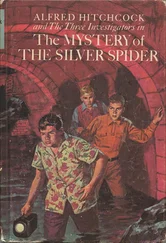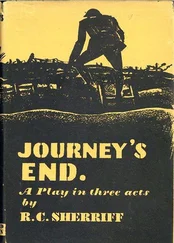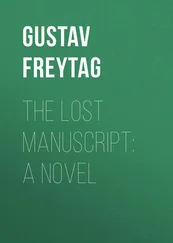Роберт Шеррифф - The Hopkins Manuscript
Здесь есть возможность читать онлайн «Роберт Шеррифф - The Hopkins Manuscript» весь текст электронной книги совершенно бесплатно (целиком полную версию без сокращений). В некоторых случаях можно слушать аудио, скачать через торрент в формате fb2 и присутствует краткое содержание. Год выпуска: 2018, ISBN: 2018, Издательство: Penguin Books, Жанр: sf_postapocalyptic, humor_satire, на английском языке. Описание произведения, (предисловие) а так же отзывы посетителей доступны на портале библиотеки ЛибКат.
- Название:The Hopkins Manuscript
- Автор:
- Издательство:Penguin Books
- Жанр:
- Год:2018
- ISBN:978-0-241-34908-3
- Рейтинг книги:4 / 5. Голосов: 1
-
Избранное:Добавить в избранное
- Отзывы:
-
Ваша оценка:
- 80
- 1
- 2
- 3
- 4
- 5
The Hopkins Manuscript: краткое содержание, описание и аннотация
Предлагаем к чтению аннотацию, описание, краткое содержание или предисловие (зависит от того, что написал сам автор книги «The Hopkins Manuscript»). Если вы не нашли необходимую информацию о книге — напишите в комментариях, мы постараемся отыскать её.
The Hopkins Manuscript — читать онлайн бесплатно полную книгу (весь текст) целиком
Ниже представлен текст книги, разбитый по страницам. Система сохранения места последней прочитанной страницы, позволяет с удобством читать онлайн бесплатно книгу «The Hopkins Manuscript», без необходимости каждый раз заново искать на чём Вы остановились. Поставьте закладку, и сможете в любой момент перейти на страницу, на которой закончили чтение.
Интервал:
Закладка:
Again there was a silence. I could think of nothing to say.
‘Can you tell us something of the report?’ asked Dr Cranley.
‘I can,’ replied the Major. ‘There were some “experts” who declared that the moon would prove to be a dry, destitute mass of rock – dead and useless. Those “experts” are going to look slightly foolish next week.’
He reached for the matches. Slowly and deliberately he relit his cigar before proceeding.
‘The Muller-Henderson report will announce that the moon is by no means destitute. On the contrary it is immensely, incredibly rich. Rich in oil: rich in gold: rich in radium-bearing rock and rich in coal. The moon contains minerals sufficient to give wealth to this world undreamed of… iron – platinum – it has all been found… analysed and tested…’
One could almost feel the silence in the room. For my own part I found myself groping desperately to fit these extraordinary pronouncements into my scheme of understanding. I frankly confess that, since the cataclysm, I had been far too busy with my own urgent affairs to give any thought to the future value of the moon. For a few months it had been a ghastly menace. Now it was happily out of harm’s way in the Atlantic where, except for its inconvenience to shipping, it would never again be a factor in our daily lives.
I was still trying to realise the significance of Major Jagger’s announcement when Dr Cranley found words to break the silence.
‘But this… this is the most amazing, wonderful news!’ exclaimed the old man. ‘Is it not a fact that our earthly supply of many of these precious minerals was rapidly being exhausted?’
‘It was generally accepted that our supplies of oil and coal would have been used up in a hundred years,’ replied the Major. ‘That probably applies also to our other precious minerals. We had made reckless, improvident use of them. We were, for example, burning millions of gallons of oil every hour – every day: oil that could not be replaced.’
‘And now…?’ began the doctor.
‘Now the moon has presented us with ample supplies for many generations to come.’
Again there was silence.
‘It confirms my belief,’ said the old doctor, ‘that a divine providence lay behind this terrible cataclysm.’
‘As if,’ I exclaimed, ‘the moon, long ages ago, were wrenched away from this earth by a divine, far-seeing power that realised the greed of man! – that realised that he would squander the earth’s wealth and find it out too late! And now the moon is given to us in the hope that we have learned our lesson and will take more care of our treasures in the future! We believed the moon to be an omen of destruction – it proves to be a gift from God!’
And once again Major Jagger gave that sharp, hard laugh.
‘I envy your simple faith, Mr Hopkins.’ For a moment his eyes were upon me: then he glanced around the table with a smile. ‘I wonder whether these younger people – this younger generation – shares your happiness?’
‘I don’t see that any normal person could do otherwise,’ said Peter Cranley, and I gave the boy a grateful smile. ‘Surely every normal person must realise what a wonderful thing this is!’
‘Normal people are rarely in positions of power,’ replied the Major. ‘Mr Hopkins is a normal man. He is perfectly happy, rearing his poultry in Beadle Valley.’
‘One does not speak of “rearing” poultry,’ I began, for I resented the impudent patronage of the man’s tone, ‘one “breeds” poultry.’ I was about to amplify my statement, but the man spoke on, right over me, right through me…
‘What does Mr Hopkins care about the wealth upon the moon?… what does he care about the British Empire?’
I was so bewildered by this strange and completely irrelevant remark that I began seriously to doubt the Major’s sanity.
‘What on earth has the British Empire got to do with it?’ I exclaimed, and I almost jumped out of my chair at the vehemence of the Major’s reply.
‘Good heavens, man! – don’t you see ! Have you never for a moment considered the matter, or have your chickens sapped all your powers of thought! The moon is in the Atlantic, man! – it has blocked our sea routes to America – to Africa – to India – to Australia! – the whole power and greatness of Britain depended upon our access to the sea! Today we are an impotent little island! Our ships can sail as far as Plymouth and no farther! – we are of no more strategic importance than Finland or Denmark – or Greece! Thousands of our own people are cut off from the Motherland in our Colonial possessions – in India and Africa. They depended upon the sea power of this island… and now they are at the mercy of vast native populations who are beginning to understand that the brain centre of the British Empire is suffocated!’
‘You have made a remark to the effect that my chickens have sapped my powers of thought,’ I said. ‘I resent that remark, and demand an apology.’ I was really angry now, and had no intention of allowing the man to get away with this insult. But no one seemed to hear me – all eyes were upon that stark white face: those smouldering, fanatical eyes.
‘Surely,’ said Dr Cranley, ‘we must revise and adjust our ideas of the British Empire. The Empire was founded upon certain geographical conditions, but owing to our collision with the moon these conditions no longer exist. We must surely develop a new outlook upon world affairs to suit these new circumstances?’
‘You suggest that we betray our people overseas? – sentence them to death? – say “goodbye and good riddance” to the Empire?’
‘Dr Cranley didn’t say that!’ I rejoined with heat.
‘What can be done?’ went on the doctor in a quiet voice. ‘Surely it has been considered… is there no plan?’
‘There is a plan,’ replied the Major, pulling a map from his pocket and spreading it before us. All drew their chairs around and stared, fascinated, at the strange, unfamiliar map of the new earth. Even I myself edged a little nearer.
‘This is known as “The British Plan”. It was submitted to the International Council at The Hague last May, and was given a friendly, sympathetic reception.
‘We proposed that the territories of the moon be divided amongst the nations of Europe according to each nation’s size. Britain itself was prepared to forgo its full share on condition that we were given this “corridor” of territory, ten miles in width, which would give us direct communication with Gibraltar, and thereby to the Atlantic and Mediterranean. By running a railway down this corridor our communications with our Dominions and Colonies would be re-established.’
‘An excellent scheme,’ said Dr Cranley. ‘You say that the other nations agreed?’
‘They appreciated our vital need of access to the sea.’
‘Then what’s the trouble?’ I asked in a sharp voice, for I could not help feeling that the Major was making a great deal of fuss about nothing.
‘The Muller-Henderson report is the trouble,’ returned the Major. ‘When the nations agreed to our “corridor” to the Mediterranean the moon was generally believed to be barren and useless rock. All that they requested were certain rights of way across our corridor to their own slices of the moon so that in course of time they could explore and possibly develop. We naturally agreed to that.’
He folded the map and put it carefully into his pocketbook.
‘But today, I am afraid, the situation has completely changed. The moon, instead of being worthless, is now proved to be immensely, immeasurably rich in precious minerals, and I repeat that the cataclysm has not altered human nature.’
‘I completely fail to see why this alters the British Plan to divide the moon fairly and evenly,’ I said. ‘In fact it seems to justify this dividing up.’
Читать дальшеИнтервал:
Закладка:
Похожие книги на «The Hopkins Manuscript»
Представляем Вашему вниманию похожие книги на «The Hopkins Manuscript» списком для выбора. Мы отобрали схожую по названию и смыслу литературу в надежде предоставить читателям больше вариантов отыскать новые, интересные, ещё непрочитанные произведения.
Обсуждение, отзывы о книге «The Hopkins Manuscript» и просто собственные мнения читателей. Оставьте ваши комментарии, напишите, что Вы думаете о произведении, его смысле или главных героях. Укажите что конкретно понравилось, а что нет, и почему Вы так считаете.












